Abstract
PURPOSE: To evaluate the effectiveness of Prime Time Sister Circles (PTSC), a curriculum-based, culture- and gender-specific health intervention, in assisting mid-life African-American women to decrease the major risk factors of physical inactivity, poor nutrition and stress. METHODS: One-hundred-thirty-four African-American women were involved in 11 sites across the country in PTSC and comparison groups. PTSC uses a cognitive behavioral modality based on three theoretical approaches to reduce risk factors and promote positive health changes. Pretest and posttest (10 weeks, and six and 12 months) data were collected on various indicators. RESULTS: t test analyses demonstrated a statistically significant increase in the women's involvement in physical activity at 10 weeks, and six and 12 months. A significant 10-week difference was found in the women's diet, with them reporting eating more nutritious foods, t(77) = 3.32, p < 0.001. The women also indicated from pretest to 10 weeks, and six and 12 months that they changed what they ate to prevent disease (40.4%, 62.8%, 97.5% and 100%, respectively). A majority of the women at 10 weeks (62.7%) and 12 months (65.9%) reported utilizing stress management strategies. There was also a 60% increase in yearly mammograms and a 54% increase in blood pressures checks. Finally, 83.7% of the women at 12 months felt that the positive changes could be maintained over their lifetime. CONCLUSIONS: This study demonstrates the effectiveness of PTSC in modifying health-related knowledge, attitudes and certain high-risk behaviors in mid-life African-American women.
Full text
PDF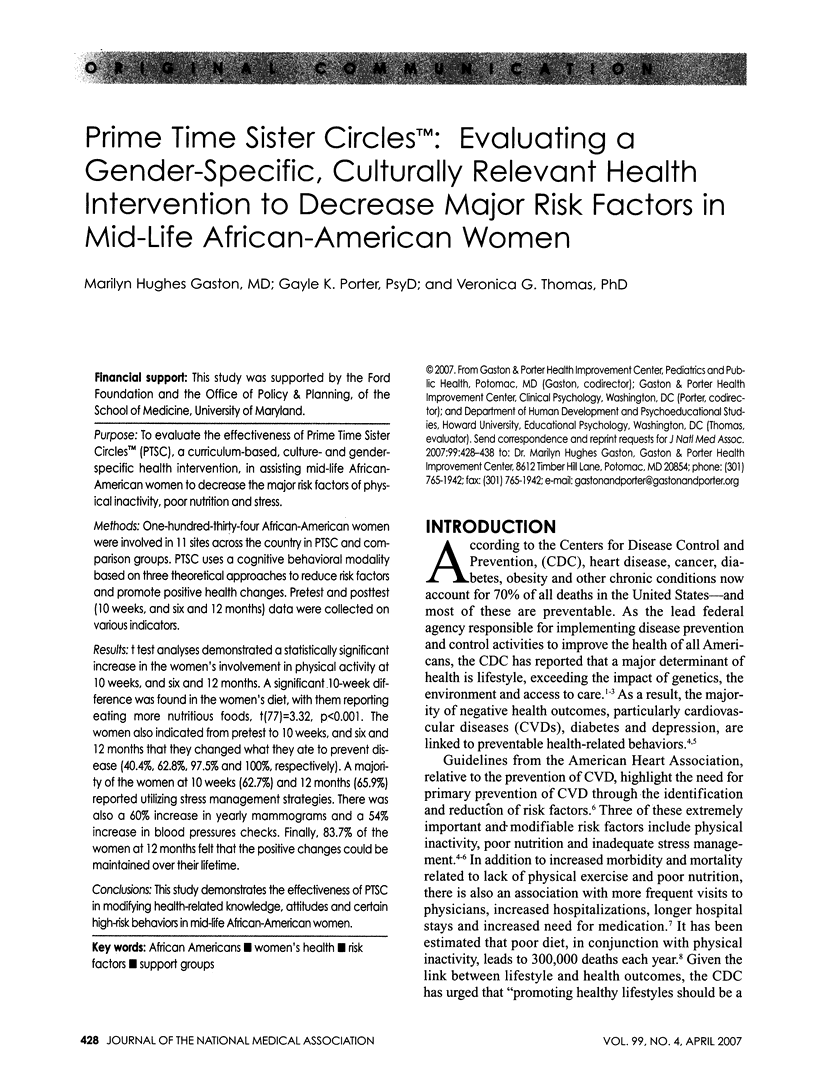
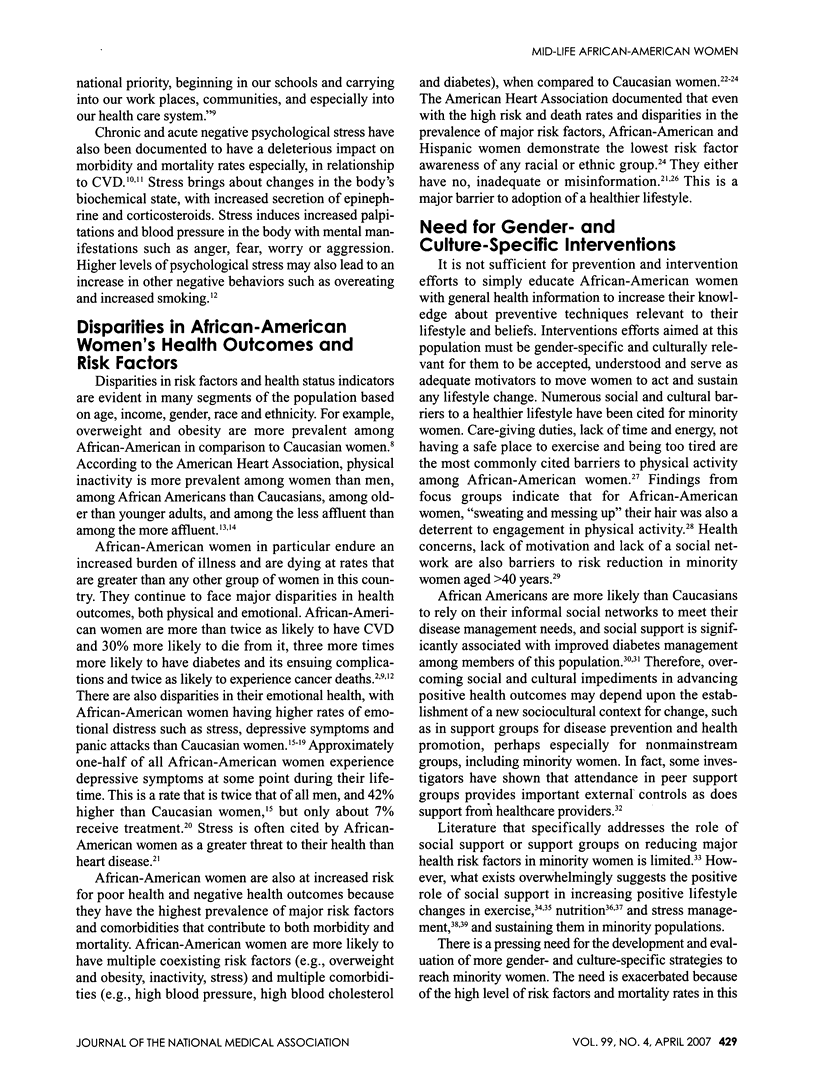
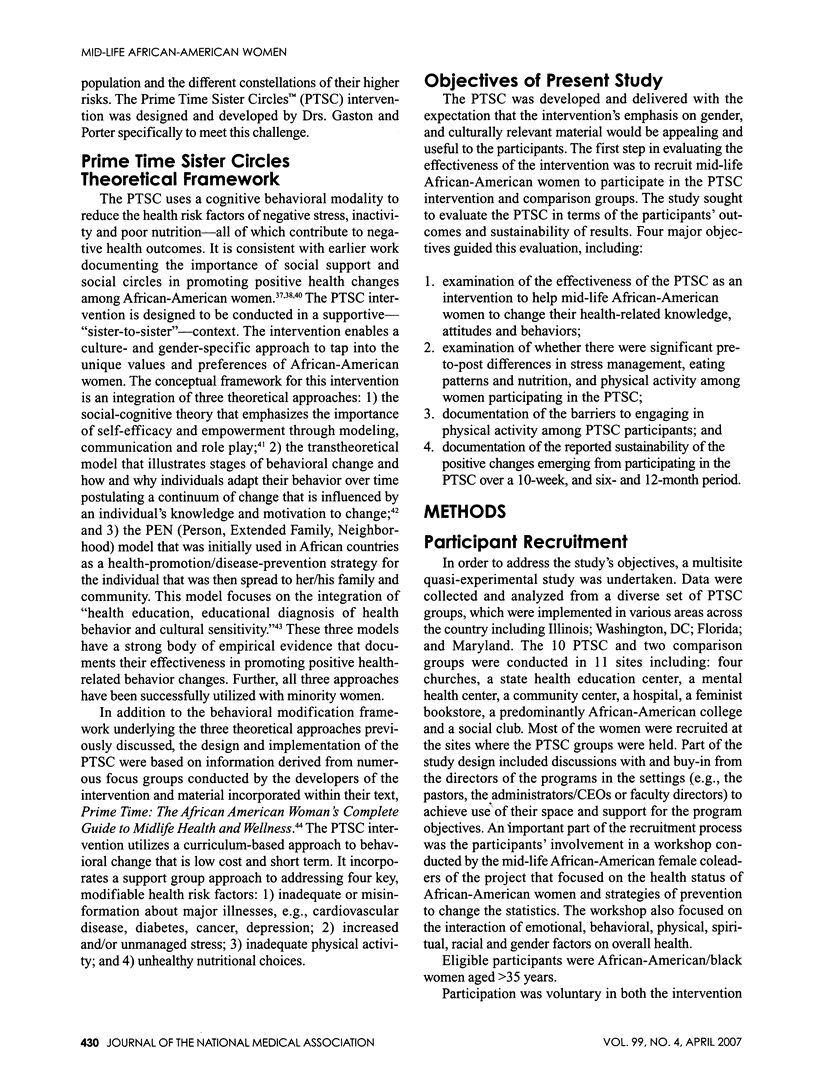
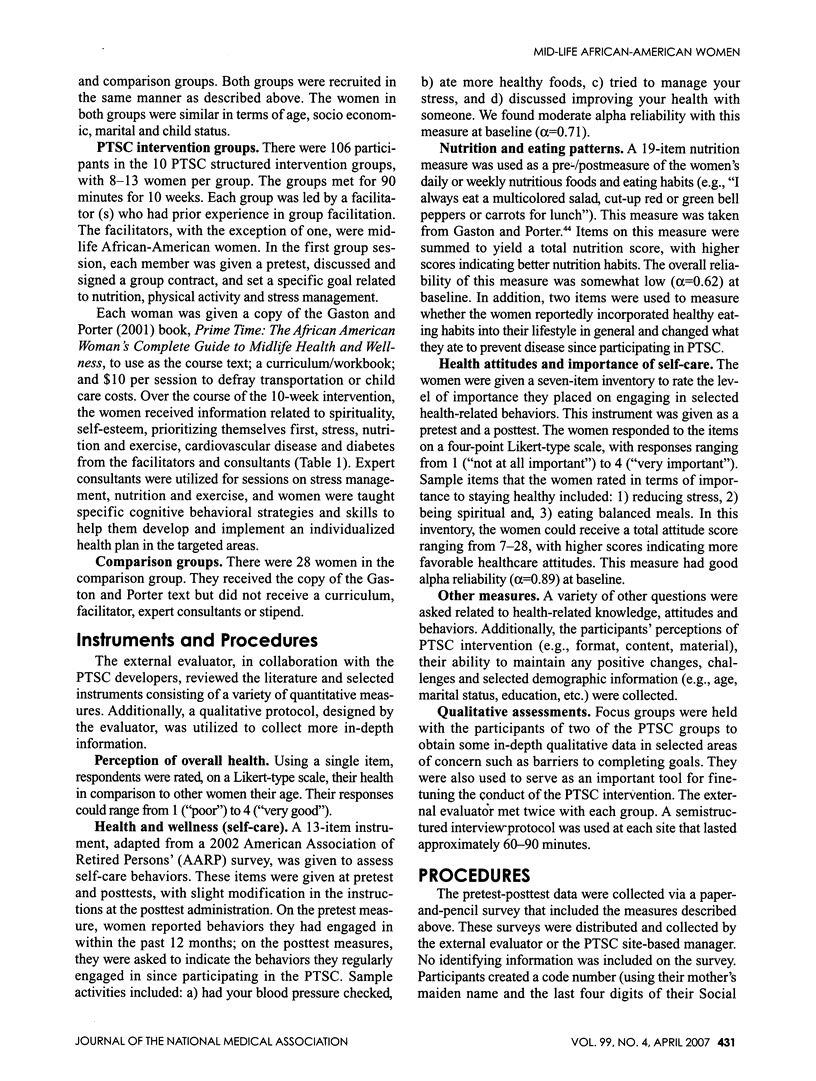
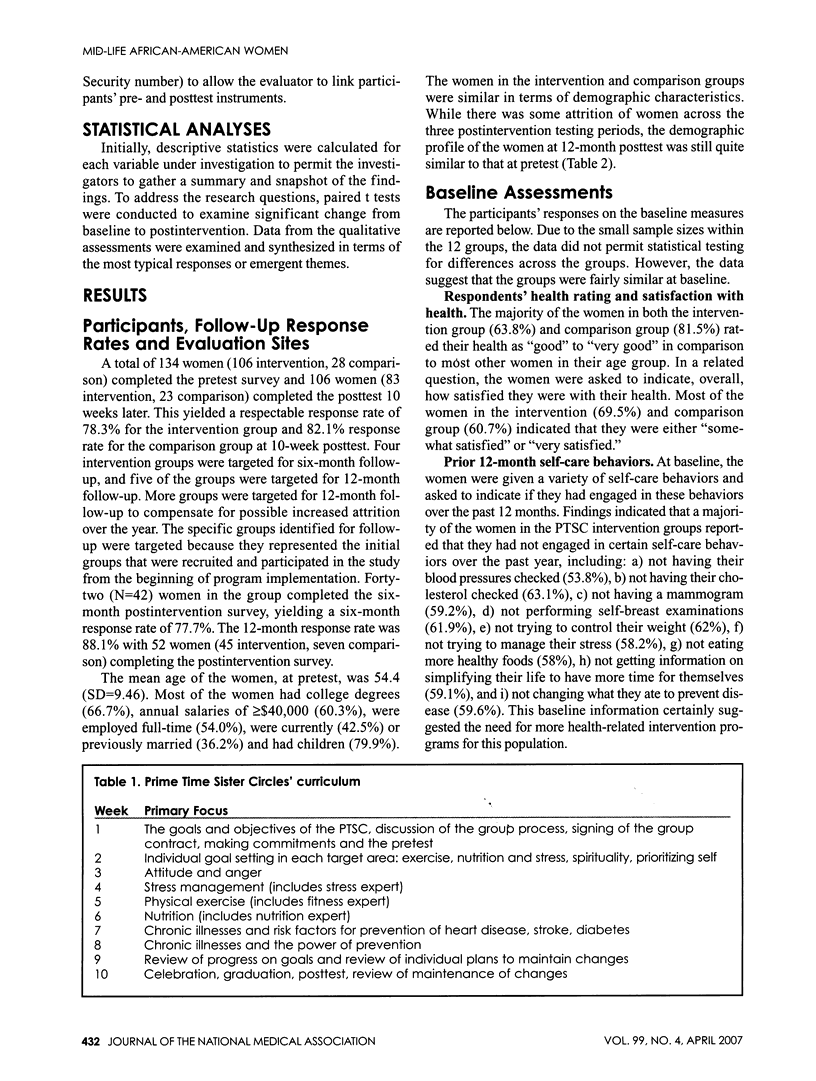
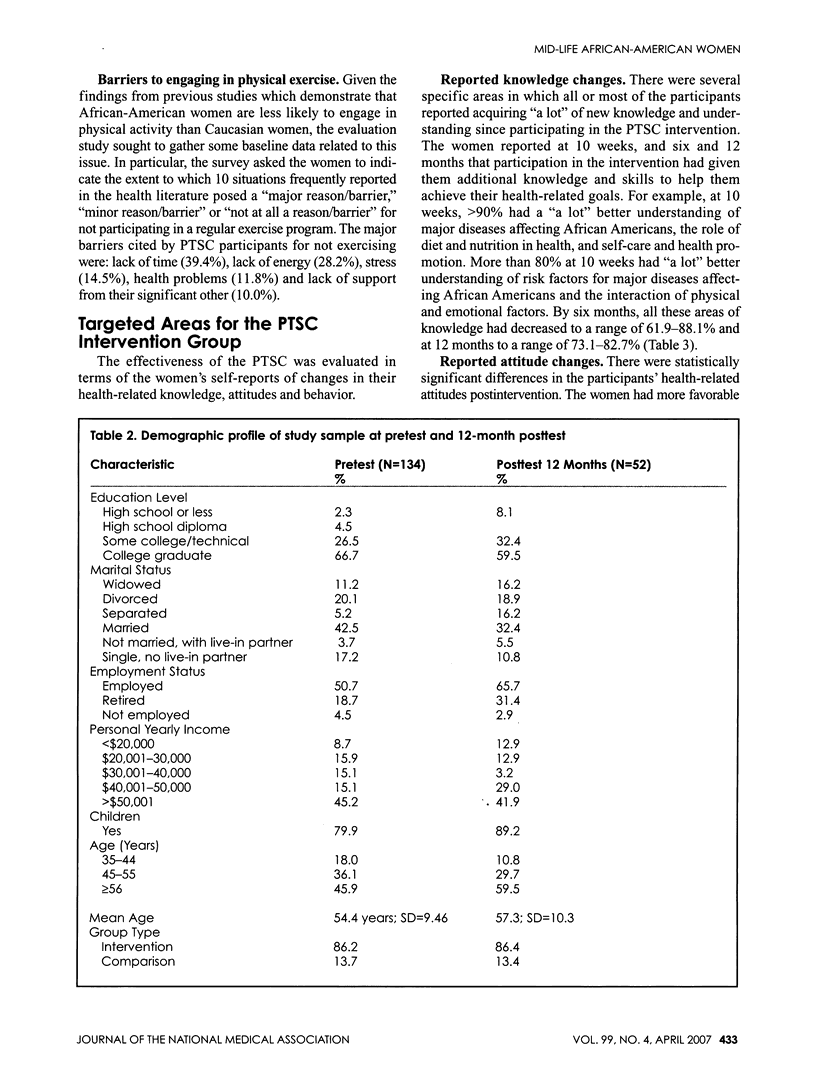
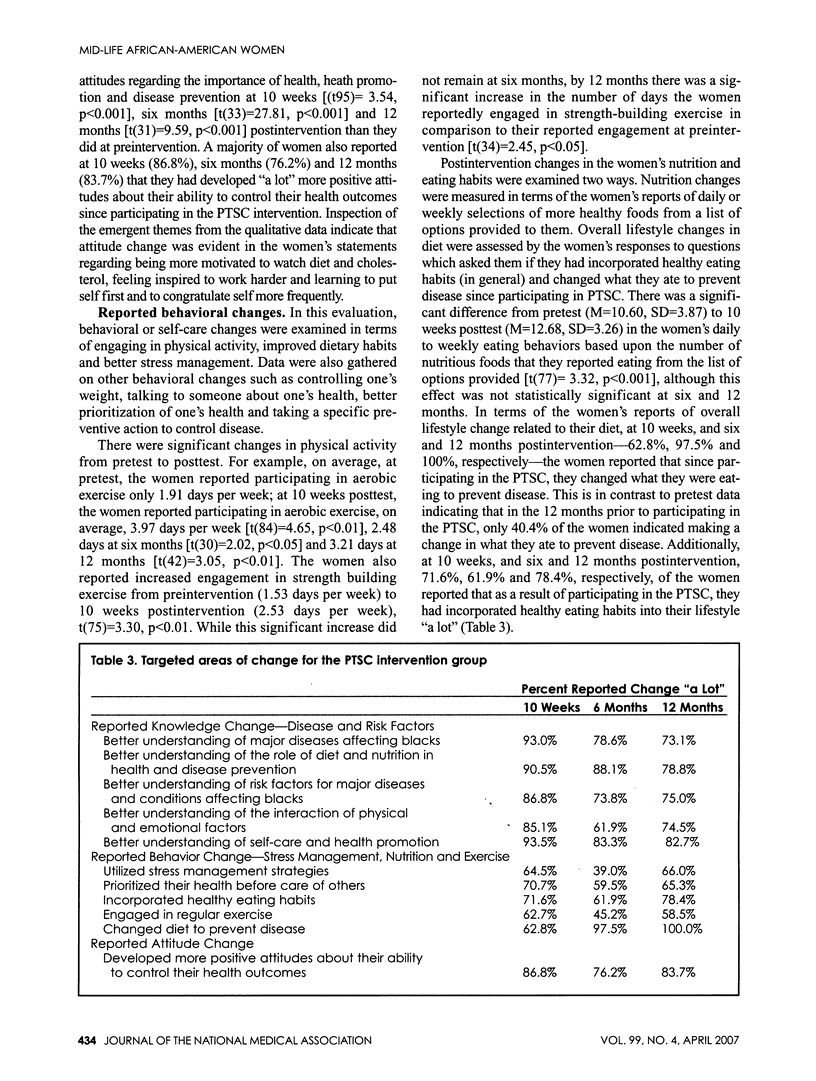
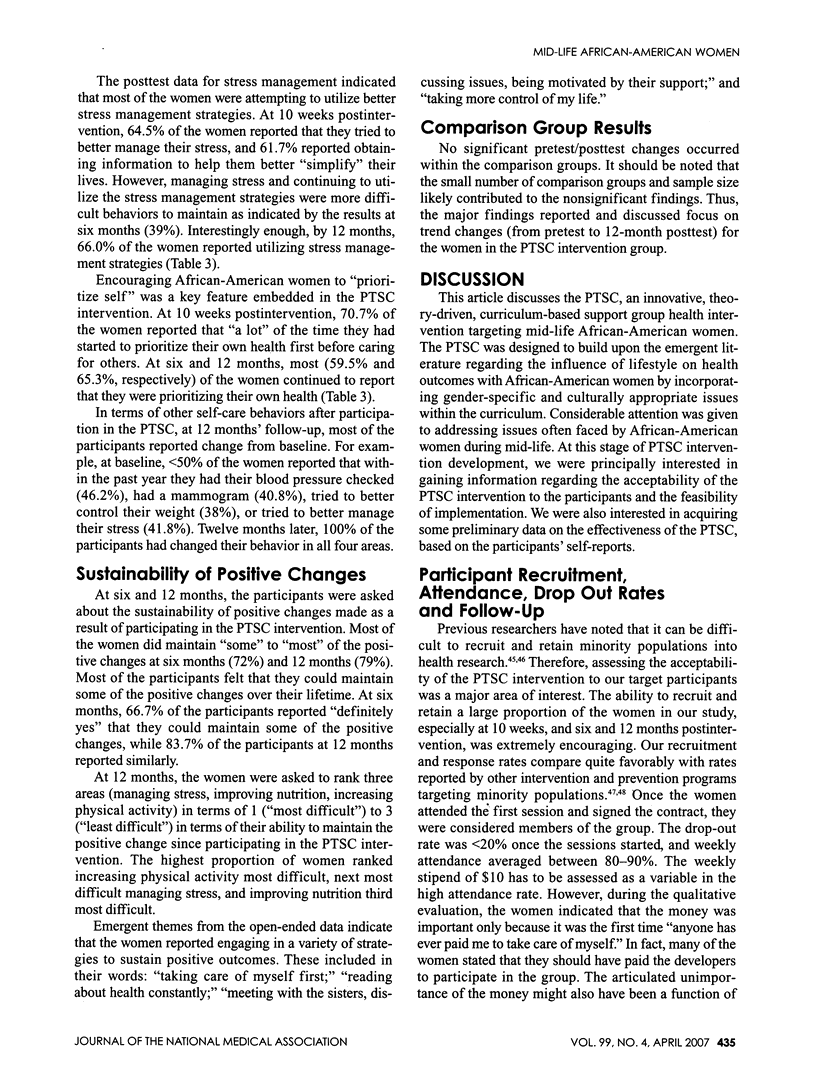
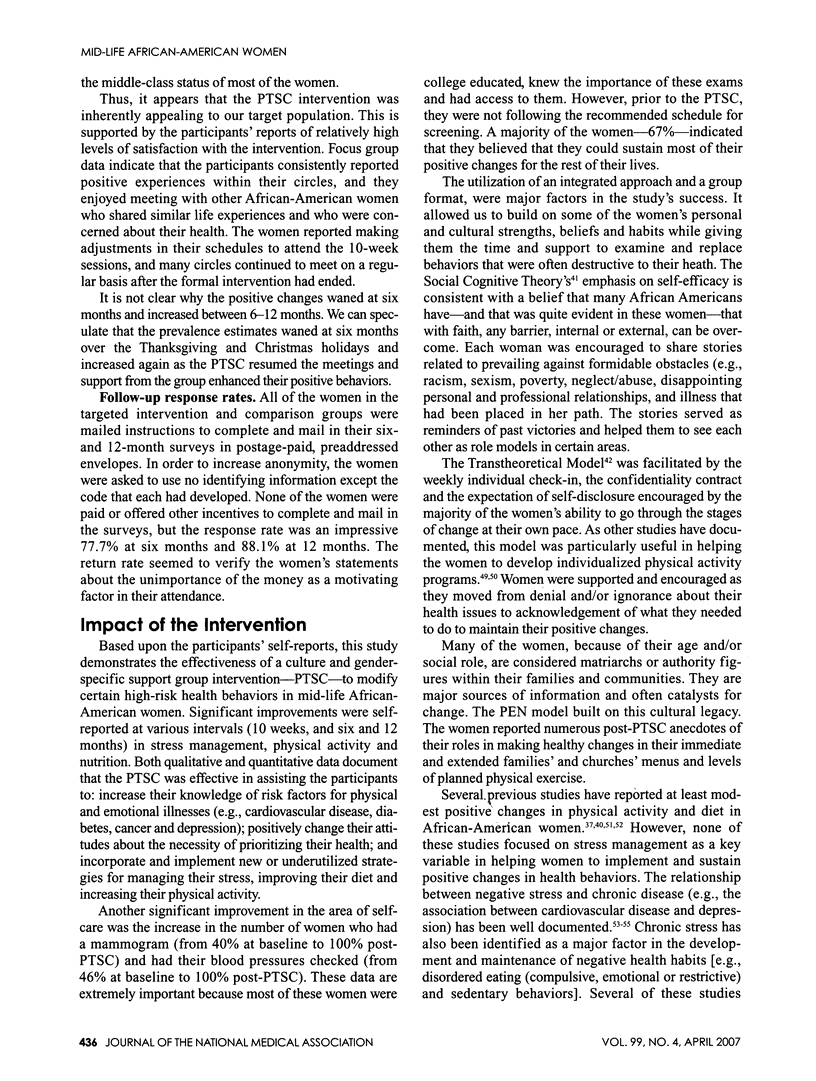
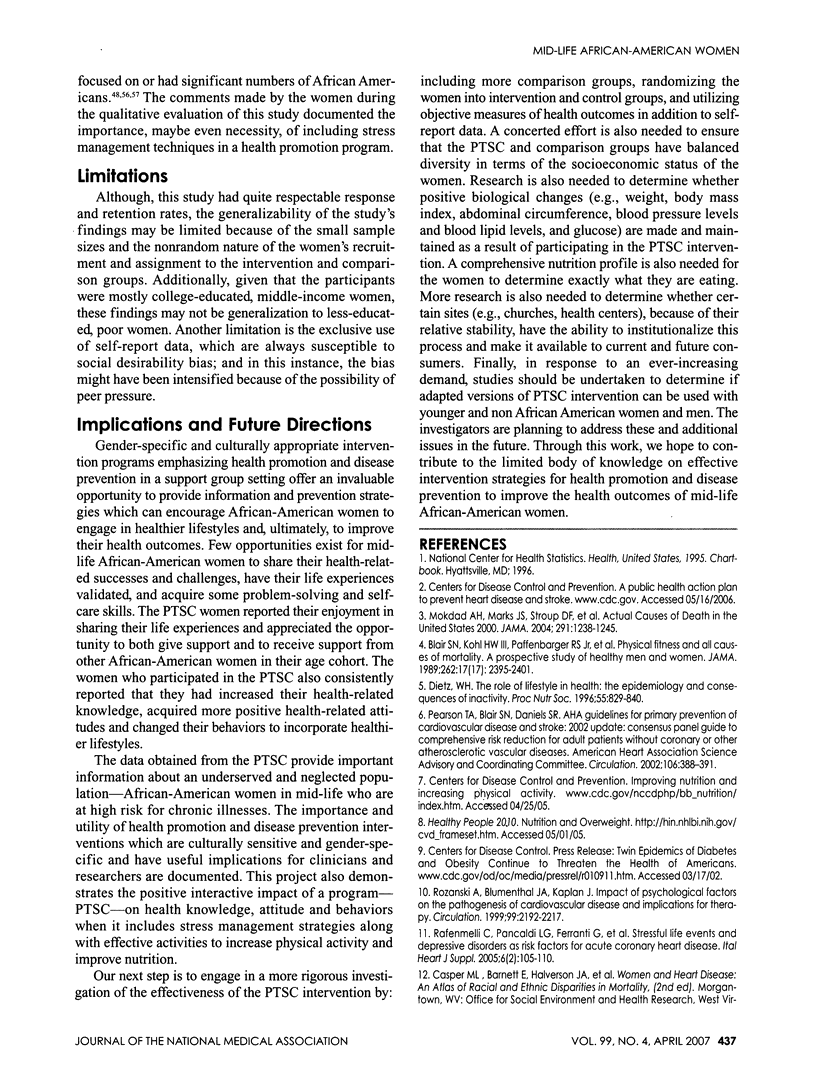
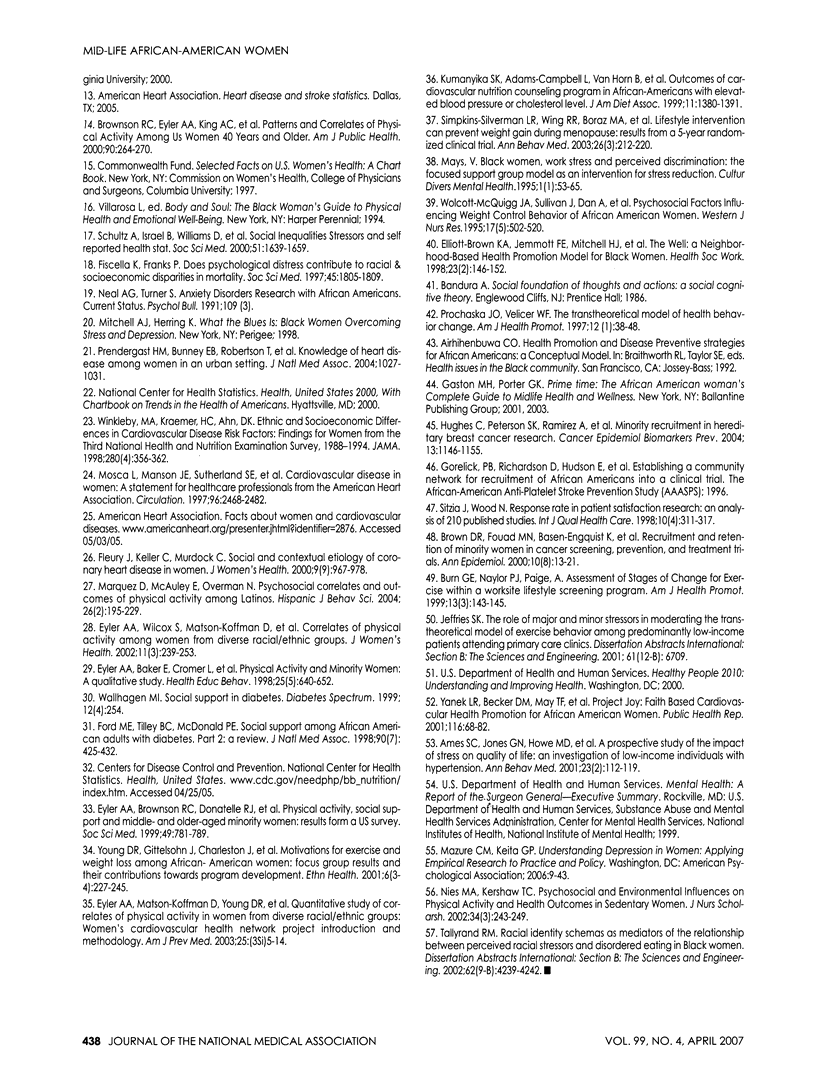
Selected References
These references are in PubMed. This may not be the complete list of references from this article.
- Ames S. C., Jones G. N., Howe J. T., Brantley P. J. A prospective study of the impact of stress on quality of life: an investigation of low-income individuals with hypertension. Ann Behav Med. 2001 Spring;23(2):112–119. doi: 10.1207/S15324796ABM2302_5. [DOI] [PubMed] [Google Scholar]
- Brown K. A., Jemmott F. E., Mitchell H. J., Walton M. L. The Well: a neighborhood-based health promotion model for black women. Health Soc Work. 1998 May;23(2):146–152. doi: 10.1093/hsw/23.2.146. [DOI] [PubMed] [Google Scholar]
- Brownson R. C., Eyler A. A., King A. C., Brown D. R., Shyu Y. L., Sallis J. F. Patterns and correlates of physical activity among US women 40 years and older. Am J Public Health. 2000 Feb;90(2):264–270. doi: 10.2105/ajph.90.2.264. [DOI] [PMC free article] [PubMed] [Google Scholar]
- Burn G. E., Naylor P. J., Page A. Assessment of stages of change for exercise within a worksite lifestyle screening program. Am J Health Promot. 1999 Jan-Feb;13(3):143–145. doi: 10.4278/0890-1171-13.3.143. [DOI] [PubMed] [Google Scholar]
- Dietz W. H. The role of lifestyle in health: the epidemiology and consequences of inactivity. Proc Nutr Soc. 1996 Nov;55(3):829–840. doi: 10.1079/pns19960082. [DOI] [PubMed] [Google Scholar]
- Eyler A. A., Baker E., Cromer L., King A. C., Brownson R. C., Donatelle R. J. Physical activity and minority women: a qualitative study. Health Educ Behav. 1998 Oct;25(5):640–652. doi: 10.1177/109019819802500510. [DOI] [PubMed] [Google Scholar]
- Eyler A. A., Brownson R. C., Donatelle R. J., King A. C., Brown D., Sallis J. F. Physical activity social support and middle- and older-aged minority women: results from a US survey. Soc Sci Med. 1999 Sep;49(6):781–789. doi: 10.1016/s0277-9536(99)00137-9. [DOI] [PubMed] [Google Scholar]
- Eyler Amy E., Wilcox Sara, Matson-Koffman Dyann, Evenson Kelly R., Sanderson Bonnie, Thompson Janice, Wilbur JoEllen, Rohm-Young Deborah. Correlates of physical activity among women from diverse racial/ethnic groups. J Womens Health Gend Based Med. 2002 Apr;11(3):239–253. doi: 10.1089/152460902753668448. [DOI] [PubMed] [Google Scholar]
- Fiscella K., Franks P. Does psychological distress contribute to racial and socioeconomic disparities in mortality? Soc Sci Med. 1997 Dec;45(12):1805–1809. doi: 10.1016/s0277-9536(97)00111-1. [DOI] [PubMed] [Google Scholar]
- Fleury J., Keller C., Murdaugh C. Social and contextual etiology of coronary heart disease in women. J Womens Health Gend Based Med. 2000 Nov;9(9):967–978. doi: 10.1089/15246090050199991. [DOI] [PubMed] [Google Scholar]
- Ford M. E., Tilley B. C., McDonald P. E. Social support among African-American adults with diabetes, Part 2: A review. J Natl Med Assoc. 1998 Jul;90(7):425–432. [PMC free article] [PubMed] [Google Scholar]
- Hughes Chanita, Peterson Susan K., Ramirez Amelie, Gallion Kipling J., McDonald Paige Green, Skinner Celette Sugg, Bowen Deborah. Minority recruitment in hereditary breast cancer research. Cancer Epidemiol Biomarkers Prev. 2004 Jul;13(7):1146–1155. [PubMed] [Google Scholar]
- Kumanyika S. K., Adams-Campbell L., Van Horn B., Ten Have T. R., Treu J. A., Askov E., Williams J., Achterberg C., Zaghloul S., Monsegu D. Outcomes of a cardiovascular nutrition counseling program in African-Americans with elevated blood pressure or cholesterol level. J Am Diet Assoc. 1999 Nov;99(11):1380–1391. doi: 10.1016/S0002-8223(99)00336-3. [DOI] [PubMed] [Google Scholar]
- Mays V. M. Black women, work, stress, and perceived discrimination: the focused support group model as an intervention for stress reduction. Cult Divers Ment Health. 1995;1(1):53–65. [PMC free article] [PubMed] [Google Scholar]
- Mokdad Ali H., Marks James S., Stroup Donna F., Gerberding Julie L. Actual causes of death in the United States, 2000. JAMA. 2004 Mar 10;291(10):1238–1245. doi: 10.1001/jama.291.10.1238. [DOI] [PubMed] [Google Scholar]
- Mosca L., Manson J. E., Sutherland S. E., Langer R. D., Manolio T., Barrett-Connor E. Cardiovascular disease in women: a statement for healthcare professionals from the American Heart Association. Writing Group. Circulation. 1997 Oct 7;96(7):2468–2482. doi: 10.1161/01.cir.96.7.2468. [DOI] [PubMed] [Google Scholar]
- Nies Mary A., Kershaw Trace C. Psychosocial and environmental influences on physical activity and health outcomes in sedentary women. J Nurs Scholarsh. 2002;34(3):243–249. doi: 10.1111/j.1547-5069.2002.00243.x. [DOI] [PubMed] [Google Scholar]
- Pearson Thomas A., Blair Steven N., Daniels Stephen R., Eckel Robert H., Fair Joan M., Fortmann Stephen P., Franklin Barry A., Goldstein Larry B., Greenland Philip, Grundy Scott M. AHA Guidelines for Primary Prevention of Cardiovascular Disease and Stroke: 2002 Update: Consensus Panel Guide to Comprehensive Risk Reduction for Adult Patients Without Coronary or Other Atherosclerotic Vascular Diseases. American Heart Association Science Advisory and Coordinating Committee. Circulation. 2002 Jul 16;106(3):388–391. doi: 10.1161/01.cir.0000020190.45892.75. [DOI] [PubMed] [Google Scholar]
- Prendergast Heather M., Bunney E. Bradshaw, Roberson Thessa, Davis Theresa. Knowledge of heart disease among women in an urban emergency setting. J Natl Med Assoc. 2004 Aug;96(8):1027–1031. [PMC free article] [PubMed] [Google Scholar]
- Prochaska J. O., Velicer W. F. The transtheoretical model of health behavior change. Am J Health Promot. 1997 Sep-Oct;12(1):38–48. doi: 10.4278/0890-1171-12.1.38. [DOI] [PubMed] [Google Scholar]
- Rafanelli Chiara, Pancaldi Leonardo Goffredo, Ferranti Giulietta, Roncuzzi Renzo, Tomba Elena, Milaneschi Yuri, Marcolin Fiorella, Colistro Maria Cristina, Di Pasquale Giuseppe. Eventi stressanti e disturbi depressivi quali fattori di rischio per sindrome coronarica acuta. Ital Heart J Suppl. 2005 Feb;6(2):105–110. [PubMed] [Google Scholar]
- Rozanski A., Blumenthal J. A., Kaplan J. Impact of psychological factors on the pathogenesis of cardiovascular disease and implications for therapy. Circulation. 1999 Apr 27;99(16):2192–2217. doi: 10.1161/01.cir.99.16.2192. [DOI] [PubMed] [Google Scholar]
- Schulz A., Israel B., Williams D., Parker E., Becker A., James S. Social inequalities, stressors and self reported health status among African American and white women in the Detroit metropolitan area. Soc Sci Med. 2000 Dec;51(11):1639–1653. doi: 10.1016/s0277-9536(00)00084-8. [DOI] [PubMed] [Google Scholar]
- Simkin-Silverman Laurey R., Wing Rena R., Boraz Miriam A., Kuller Lewis H. Lifestyle intervention can prevent weight gain during menopause: results from a 5-year randomized clinical trial. Ann Behav Med. 2003 Dec;26(3):212–220. doi: 10.1207/S15324796ABM2603_06. [DOI] [PubMed] [Google Scholar]
- Walcott-McQuigg J. A., Sullivan J., Dan A., Logan B. Psychosocial factors influencing weight control behavior of African American women. West J Nurs Res. 1995 Oct;17(5):502–520. doi: 10.1177/019394599501700504. [DOI] [PubMed] [Google Scholar]
- Winkleby M. A., Kraemer H. C., Ahn D. K., Varady A. N. Ethnic and socioeconomic differences in cardiovascular disease risk factors: findings for women from the Third National Health and Nutrition Examination Survey, 1988-1994. JAMA. 1998 Jul 22;280(4):356–362. doi: 10.1001/jama.280.4.356. [DOI] [PubMed] [Google Scholar]
- Wyngaarden J. B. From the National Institutes of Health. JAMA. 1989 Jul 7;262(1):17–17. [PubMed] [Google Scholar]
- Young D. R., Gittelsohn J., Charleston J., Felix-Aaron K., Appel L. J. Motivations for exercise and weight loss among African-American women: focus group results and their contribution towards program development. Ethn Health. 2001 Aug-Nov;6(3-4):227–245. doi: 10.1080/13557850120078143. [DOI] [PubMed] [Google Scholar]


